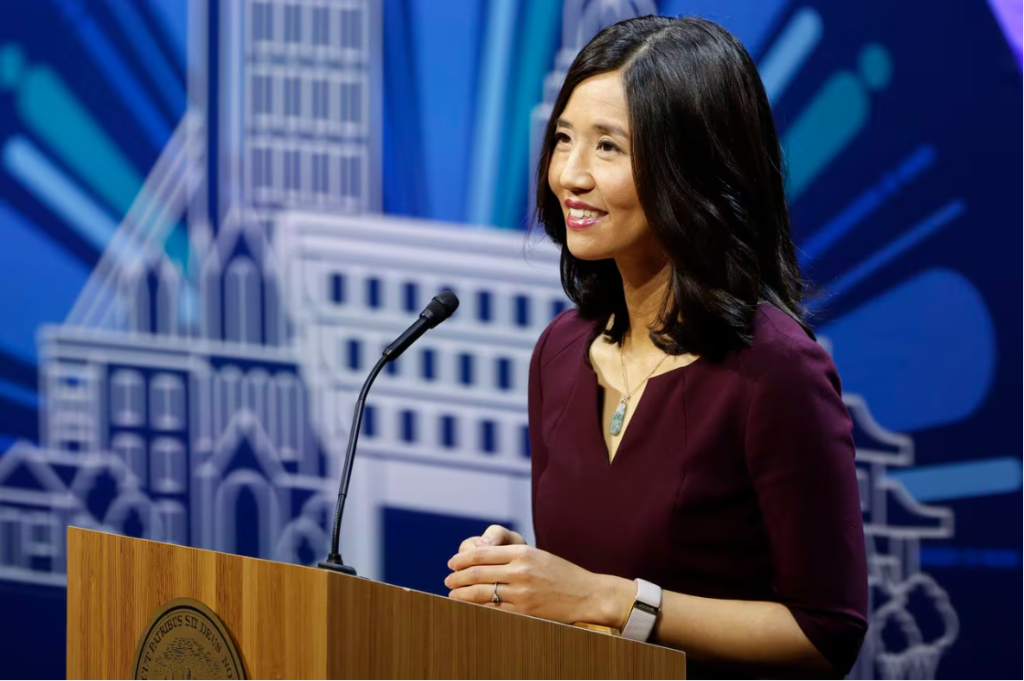由于波士顿写字楼市场陷入困境,市长吴弭寻求提高商业税率以支持城市预算

【中美创新时报2024 年 3 月 29 日讯】(记者温友平编译)波士顿市长表示商业价值下降可能迫使该市提高商业房产税,或进行痛苦的削减预算。《波士顿环球报》记者凯瑟琳·卡洛克(Catherine Carlock) 对此进行了下述报道。
由于波士顿写字楼市场在大流行后长期低迷,市长吴弭周四(28日)表示,她将采取行动提高商业房地产税率,以缓解房地产价值下跌对该市超过 40 亿美元的预算以及居民造成的打击。
吴弭下周将向市议会提交一项措施,提高该市对商业地产征收的税率长达五年,以防止“对住宅业主造成突然、剧烈和集中的冲击”,她说 。如果获得理事会批准,则将提交立法机关批准。
“商业房地产价值的下降可能会大幅增加公寓楼和房主的财产税,这将加剧我们本已严峻的负担能力挑战,”吴弭说。 “我们需要采取积极主动的措施来确保……市中心的挑战和不断变化的工作模式并没有加剧我们居民和房主的住房危机。”
财产税占波士顿 43 亿美元预算的绝大部分,其中大部分来自商业建筑,而商业建筑的税率已经是住宅税率的两倍多。在波士顿等实行分割税率的城市,州法律限制商业税率可以提高多少,住宅税率可以降低多少。吴弭正在寻求扩大这些限制,并需要立法机关的许可才能这样做。
如果商业建筑价值继续下跌,可能会迫使该市在提高房主税收和痛苦的预算削减之间做出选择,这是吴弭希望避免的选择。
吴弭说:“这一转变将有助于我们稳定我们的财产税制度,保持负担能力,并在短时间内对价值变化产生更平稳、更温和的影响,在商业和住宅业主之间进行更可持续的分配。”
目前,商业和工业地产的税率为每 1,000 美元评估价值 25.27 美元,而住宅税率为每 1,000 美元评估价值 10.90 美元。目前尚不清楚如果吴弭提出的地方自治请愿书获得通过,新的税率将会是多少。
拟议的变化是在办公空间的预测很少如此不确定的情况下提出的。塔夫茨大学国家政策分析中心为波士顿政策研究所发布的一项研究估计,未来五年商业地产税收可能比之前的预测减少 12 亿至 15 亿美元。就在本周,波士顿市中心的一座办公楼售价比 2005 年下降了 36%。
开发商行业团体表示,在该市的建设和租赁已显着放缓之际,吴弭的提议,加上最近的其他新收费和规定,可能会吓跑建筑商。
大波士顿房地产委员会首席执行官格雷格·瓦西尔表示:“我们深感担忧的是,提高商业税率以弥补收入损失只会让我们更接近美国许多其他城市所出现的城市末日循环。” “这是一个与过去 30 年中任何时期都不一样的时期,给陷入困境的行业增加更多的财务负担根本不是解决办法。”

“我们需要采取积极主动的措施来确保…… 市中心的挑战和不断变化的工作模式并没有加剧我们居民和房主的住房危机。”波士顿市长吴弭(Michelle Wu) 表示。DANIELLE PARHIZKARAN/GLOBE STAFF
吴弭的提议与 2004 年初时任市长托马斯·M·梅尼诺 (Thomas M. Menino) 的类似举措非常相似,当时该市的写字楼市场在 2000 年代初期的互联网泡沫破灭和经济衰退之后陷入困境。商业税率的临时提高(最终到期)也伴随着对新开发和建设的强烈关注——特别是在当时新生的南波士顿海滨。
吴弭发言人里卡多·佩特隆(Ricardo Patrón)表示,如果没有这一转变,单户住宅的平均财产税将增加约 35%,而商业地产的税收将减少约 15% 至 20%。相反,该市的平均住宅账单增长了 15% 至 18%,而商业税账单仅下降了 5% 至 8%,他说。
但发展格局与20年前截然不同。波士顿的商业写字楼空置率达到数十年来的最高水平。新的开发计划已经放缓为涓涓细流,该市很少有大型项目能够获得融资来开工。许多开发商表示,在波士顿建造住房的经济效益目前行不通。
哈佛大学经济系主任、吴弭顾问埃德·格莱泽 (Ed Glaeser) 表示:“这肯定会进一步限制在波士顿建设商业空间的热情,但无论如何,很可能只会建造很少的商业空间。”
格莱泽表示,这项措施可能会促使更多开发商寻求将办公楼改建为住宅。该市的改造试点计划将于今年 6 月开放,如果开发商在 2025 年 10 月之前开始建设改造项目,他们将获得大量税收减免。
总部位于波士顿的 HYM Investment Group 开发商托马斯·N·奥布莱恩 (Thomas N. O’Brien) 表示,他支持吴弭的举动,他在 20 世纪 90 年代末担任梅尼诺 (Menino) 领导下的波士顿重建局局长。但他强调,这需要与“有关潜在新增长或新项目的一些想法”相结合。
该市表示,并不担心房地产价值下降会导致收入减少;这就是它寻求提高利率的原因。
“价值下降意味着税率增加,而不是收入减少,”帕特龙说。“你收取的总额是相同的——只是为了收取它而以更高的税率征税。”
马萨诸塞州经济适用房联盟执行董事西蒙·克劳福德表示,购房者一直在努力应对不断上涨的住房成本,稳定住宅税至关重要。
克劳福德说:“这项规定将有助于减轻居民的额外开支,同时仍为城市提供必要的资金。”
如果市和州议员批准地方自治请愿书,吴弭政府最早可以在今年 7 月实施税收转移,或者推迟到 2025 年 7 月或 2026 年。届时,税收转移将持续四到五年 年。 波士顿首席财务官阿什利·格罗芬伯格 (Ashley Groffenberger) 表示,现在这样做将使该市能够灵活地决定何时以及是否确实想要进行这种改变。
“我们现在正在积极采取这一步…… 以避免居民的不确定性,”她说。
马萨诸塞州市政协会执行董事、前阿灵顿镇经理亚当·查德莱恩 (Adam Chapdelaine) 表示,州法律 2.5 号提案严格限制了财产税的收入,但吴的提案将为波士顿提供灵活性,以应对不断变化的商业房地产市场 。
查德莱恩说:“这使地方政府有能力管理财产税对其居民的影响。” “这应该是赋予地方政府的核心能力、核心灵活性。”
题图:财产税为波士顿 43 亿美元预算的绝大部分提供了资金。 LANE TURNER/GLOBE STAFF
附原英文报道:
As office market struggles, Wu seeks commercial tax rate hike to bolster city budget
The mayor says falling commercial values could force the city to hike residential property taxes, or make painful cuts
By Catherine Carlock Globe Staff,Updated March 28, 2024
With Boston’s office market in a prolonged post-pandemic slump, Mayor Michelle Wu on Thursday said she’ll move to hike tax rates on commercial real estate to cushion the blow falling property values will have on the city’s $4-plus billion budget — and on residents.
Wu next week will file a measure with the City Council to boost the tax rate the city can levy on commercial properties for up to five years in an effort to prevent a “sudden, dramatic, and concentrated shock to residential property owners,” she said. If approved by the council, it would then go to the Legislature for approval.
“Declines in commercial real estate values could significantly increase property taxes for apartment buildings and homeowners, which would deepen our already serious affordability challenges,” Wu said. “We need to take proactive steps to ensure . . . that challenges with downtown and the shifting work patterns are not compounding our housing crisis for residents and homeowners.”
Property taxes fund the vast majority of Boston’s $4.3 billion budget, much of them generated by commercial buildings, which are already taxed at more than twice the rate of residential. In municipalities such as Boston that have a split tax rate, state law limits how much higher commercial rates can be, and how much lower residential rates can go. Wu is seeking to expand those limits and needs permission from the Legislature to do so.
Should commercial building values continue to fall, that could force the city to choose between higher taxes on homeowners and painful budget cuts, a choice Wu wants to avoid.
“The shift would help us stabilize our property tax system, preserve affordability, and create a smoother, more moderate impact on value changes over a short transition period, more sustainably distributed between commercial and residential property owners,” Wu said.
Currently, the tax rate for commercial and industrial properties is $25.27 per $1,000 of assessed value, compared to a residential rate of $10.90 per $1,000. It’s not clear what the new rates would be if Wu’s proposed home-rule petition comes to pass.
The proposed change comes as the forecast for office space in particular has rarely been so uncertain. A study published earlier this year by Tufts University’s Center for State Policy Analysis for the Boston Policy Institute estimates that tax revenue from commercial property could fall $1.2 billion to $1.5 billion below prior projections over the next five years. Just this week, an office tower in downtown Boston sold for 36 percent less than it did in 2005.
Trade groups for developers said Wu’s proposal, on top of other recent new fees and regulations, risks scaring off builders at a time when the city has already seen construction and leasing slow markedly.
“We are deeply concerned that increasing commercial tax rates to recoup lost revenue will only take us closer to the urban doom loop being seen in many other American cities,” said Greg Vasil, chief executive of the Greater Boston Real Estate Board. “This is a time unlike any other in the last 30 years, and piling more financial burdens on a struggling industry is no solution at all.”
Wu’s proposal closely mirrors a similar move by then-mayor Thomas M. Menino in early 2004, when the city’s office market was struggling in the wake of the dot-com bust and recession of the early 2000s. The temporary boost to commercial tax rates, which eventually expired, was also paired with an intense focus on new development and construction — particularly in the then-nascent South Boston Waterfront.
Without the shift then, the average property-tax bill for a single-family home would have increased by about 35 percent, while taxes for commercial properties would have decreased by about 15 percent to 20 percent, said Wu spokesperson Ricardo Patrón. Instead, the city saw the average residential bill increase a more modest 15 percent to 18 percent, while commercial tax bills declined by just 5 percent to 8 percent, he said.
But the development landscape was far different 20 years ago. Commercial office vacancy in Boston is at its highest level in decades. New development proposals have slowed to a trickle, and few large-scale projects in the city are able to get financing to start construction. Many developers say the economics to build housing in Boston just don’t work right now.
“This is assuredly going to further limit any enthusiasm about building commercial space in Boston — but it may well be that very little commercial space was going to be built anyway,” said Ed Glaeser, chair of Harvard’s economics department and a Wu adviser.
Glaeser said the measure could prompt more developers to pursue office-to-residential conversions. The city’s conversion pilot program, open through this June, gives developers sizable tax breaks if they start construction on conversion projects by October 2025.
Developer Thomas N. O’Brien of Boston-based the HYM Investment Group, who was director of the Boston Redevelopment Authority in the late 1990s under Menino, said he supports Wu’s move. But he emphasized it needs to be paired with “some ideas around potential new growth or new projects.”
The city said it’s not concerned that a decrease in real estate values could translate into less revenue; that’s why it’s seeking to increase rates.
“A decline in value means an increase in tax rates, not a decline in revenue collected,” Patrón said. “You are collecting the same total amount — you’re just taxing it at a much higher rate in order to collect it.”
Homebuyers have struggled with rising housing costs, and stabilizing residential taxes is crucial, said Symone Crawford, executive director of the Massachusetts Affordable Housing Alliance.
“This provision will help alleviate additional expenses for the residents, while still providing necessary funding for the city,” Crawford said.
If city and state lawmakers approve the home-rule petition, the Wu administration could implement the tax shift as soon as this July, or push it out to July 2025 or 2026. When it does, the shift would be in place for four to five years. Doing this now would give the city flexibility to decide when and if it does want to make that change, said Ashley Groffenberger, Boston’s chief financial officer.
“We’re being proactive in taking this step now . . . to avoid the uncertainty for residents,” she said.
Proposition 2½, a state law, tightly caps how much revenue can come from property taxes, but Wu’s proposal would give Boston flexibility to address the shifting commercial property market, said Adam Chapdelaine, executive director of the Massachusetts Municipal Association and a former Arlington town manager.
“This gives a local government an ability to manage the way the property tax is impacting its residents,” Chapdelaine said. “That should be a core ability, a core flexibility that is granted to local government.”



